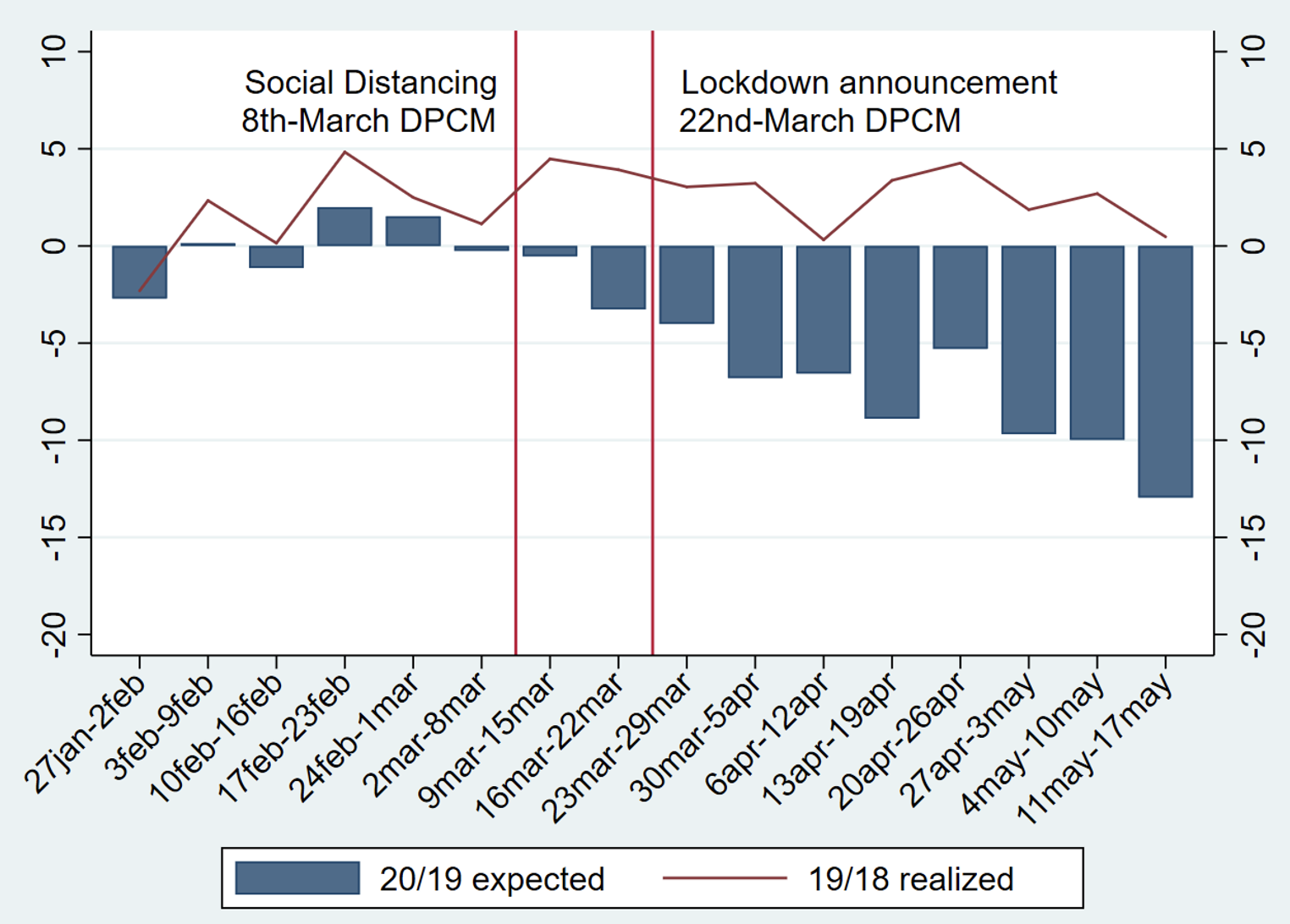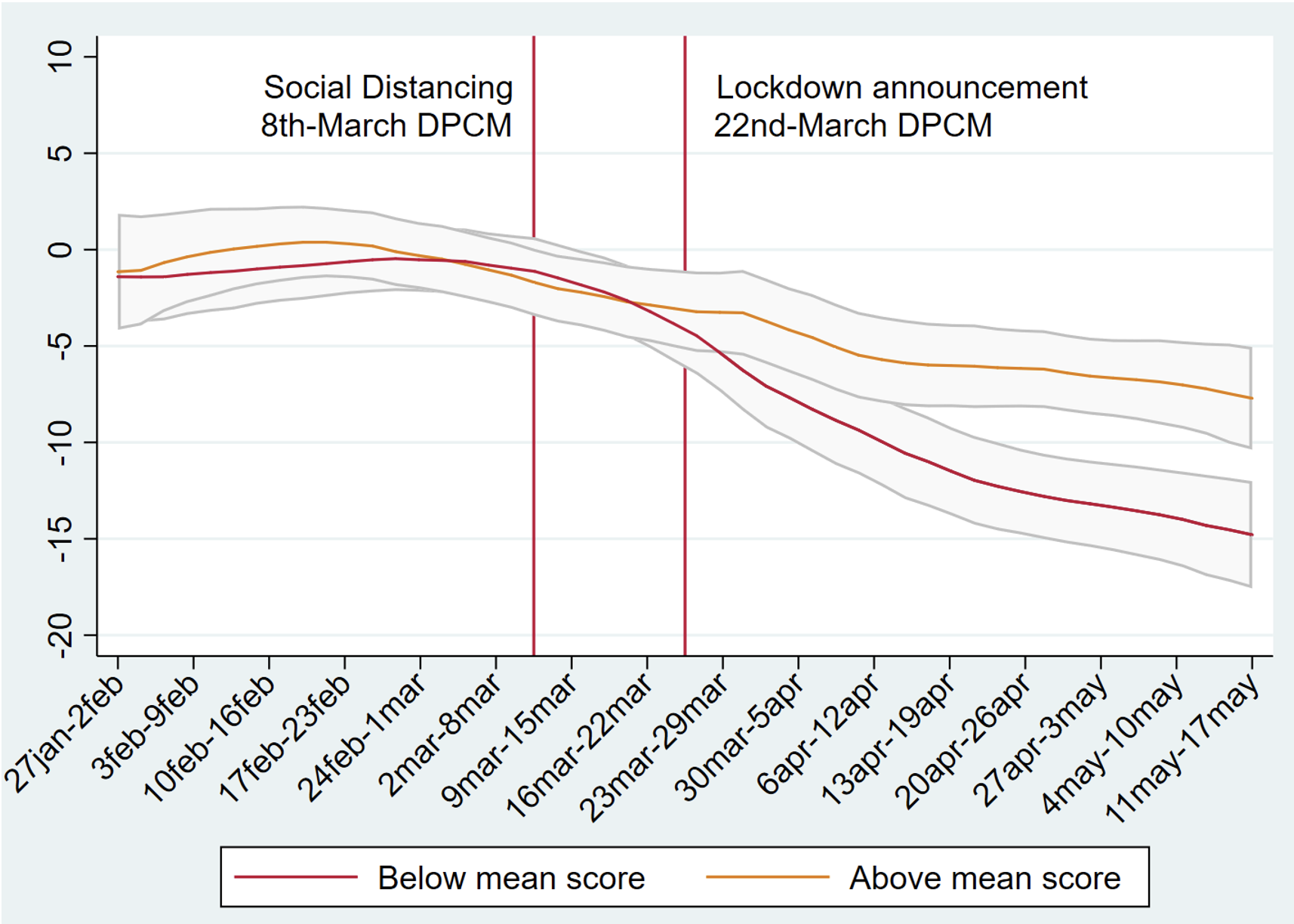The outbreak of the COVID-19 pandemic required extreme measures limiting freedom of movement, driving most countries to impose a lockdown of non-essential economic activities. Western industrialised countries had not witnessed an event of such magnitude since the Spanish Influenza, so the policy measures were novel and unprecedented.
Italy was the first country to introduce these measures. The first official case of COVID-19 was found on 21 February 2020. Initially, restrictions were confined to 11 municipalities in Lombardy and Veneto, which were declared ‘red zones’,1 soon after which the government issued a series of emergency decrees (DPCM). On 8 March, the red zone status was extended to 15 additional provinces, and within three days the measures of social distancing were applied to the whole country (the ‘stay at home’ campaign). Sunday 22 March marked the introduction of the nationwide lockdown, consisting of the shutting down of plants producing any goods and services except those on a list of essential goods or those that were part of related value chains. Firms were still allowed to continue activities that could be performed through remote working.
While in other countries firms could anticipate lockdowns based on the Italian example (Buchheim et al. 2020), the measure came as a complete surprise to Italian firms. This is evident in the sharp decline of sales forecasts by firms in the weeks following the first widespread social distancing measures (on 8 March) and national lockdown announcement (on 22 March).
Figure 1 Sales growth by week of response to the 2020 Survey of Industrial and Service Firms (INVIND) survey
Notes: The sample consists of 1803 firms which responded to the 2020 INVIND survey of the Bank of Italy. The blue bars are the average 2020 year-over-year (YoY) expected sales growth, while the red line is the average 2019 YoY sales growth. The vertical lines correspond to the announcement dates of widespread social-distancing restrictions in Italy (8 March) and country-wide lockdown (22 March).
In a recent paper (Lamorgese et al. 2021), we investigate the role of management practices in Italian firms’ response to COVID-19. While management practices are highly correlated with firm performance in normal times (Bloom and Van Reenen 2007), at the outset it is not clear that management practices necessarily helped firms respond to the COVID-19 shock. While they may provide firms with tools and information to better direct firm strategy, they may also impose excessive structure and constraints when flexibility is valuable.
Figure 2 plots the evolution of the average expected sales growth in 2020 by week of response separately for firms with management above and below the mean of the calculated score.2 Before the lockdown, there is no difference in expected sales between the two groups. However, following the lockdown announcement, better-managed firms reported significantly lower declines in expected sales (Figure 2).
Figure 2 Sales growth over the evolution of COVID-19, by management score
Notes: The y-axis of the graph shows smoothed values of mean YoY sales growth from the 2020 INVIND survey across weeks reported on the x-axis for firms in two groups: those with above mean management score, and those with below it. The outcome variable is calculated through kernel-weighted local polynomial regressions of YoY expected sales growth on week of response for firms. The bands shown are 95% confidence intervals and the vertical lines correspond to the announcement dates of widespread social-distancing restrictions in Italy (8 March) and country-wide lockdown (22 March).
Following the lockdown, managerial practices are associated with lower expected sales drops: a one standard deviation increase in the management score increases expected sales growth by 2.4%, about 30% of the average drop (-8.3%). The finding is further confirmed using early information on realised sales growth.3 In our analysis, we control for a rich set of firm characteristics that are typically correlated with managerial practices and might also affect the response to the shock, including size, productivity, export status, human capital and technology adoption. Our results are extremely robust: even when we allow for the effects of each of these characteristics to differ before and after the lockdown, the estimated coefficient of the managerial practices in the lockdown period remains unchanged.
Greater adoption of remote work by better managed firms
A short ad-hoc survey conducted by the Bank of Italy on the impact of COVID-19 on firms shows that the channels through which the COVID-19 shock affected firm operations (lack of demand, labour issues, finance, etc.) are orthogonal to our management measure, limiting the concern that the shock may be systematically correlated with management practices. This implies that the difference in performance is driven by differential responses to the COVID shock by better-managed firms. Examining the strategies firms put in place to counteract the shock, management is positively and significantly associated with increases in the share of employees engaged in remote work in 2020, controlling for the corresponding share in 2019. Specifically, we find that the monitoring and incentives components of the management score is driving the results.
Remote working may require more monitoring and incentives
Our findings suggest that remote working may be easier to implement for firms with structured management practices, particularly the monitoring and incentives components of management. Monitoring by managers of the levels to which employees are achieving previously set targets may prove to be useful during the pandemic because it allows a seamless transition to remote work without the need to implement additional organisational changes. In addition, when managers cannot track the input of workers through direct monitoring, output-based incentives practices – i.e. practices that set goals, measure outcomes, and reward workers accordingly – may prove to be helpful.
The implications of our study are especially relevant for small and medium enterprises, who have suffered disproportionately in the pandemic while large firms have adapted to remote working quicker (Bartik et al. 2020, Taneja et al. 2021). Modern management practices are standardised and relatively cheap to implement (Bloom et al. 2013). While all jobs cannot be done remotely (Adam-Prassl et al. 2020, Baldwin 2020, and Gottlieb et al. 2021), such practices may help mitigate some of the declines in worker productivity seen in remote working settings (Morikawa 2021).
Authors’ note: The views expressed in this column are those of the authors only. They do not necessarily represent the views of the Bank of Italy.
References
Adam-Prassl, A, T Boneva, M Golin and C Rauh (2020), “Working from home: The polarising workplace”, VoxEU.org, 2 September.
Baldwin, R (2020), “Covid, hysteresis, and the future of work”, VoxEU.org, 29 May.
Bartik, A, Z Cullen, E Glaeser, M Luca and C Stanton (2020), “How the COVID-19 crisis is reshaping remote working”, VoxEU.org, 19 July.
Bloom, N, B Eifert, A Mahajan, D McKenzie, and J Roberts (2013), “Does management matter? Evidence from India”, The Quarterly Journal of Economics 128(1): 1–51.
Bloom, N and J Van Reenen (2007), “Measuring and explaining management practices across firms and countries”, The Quarterly Journal of Economics 122(4): 1351–1408.
Bloom, N, E Brynjolfsson, L Foster, R Jarmin, M Patnaik, I Saporta-Eksten, and J Van Reenen (2019), “What drives differences in management practices?”, American Economic Review 109(5): 1648–83.
Buchheim, L, C Krolage, and S Link (2020), “Sudden stop: When did firms anticipate the potential consequences of covid-19?” CESifo Working Paper No. 8429.
Gottlieb, C, J Grobovšek, M Poschke, and F Saltiel (2021), “Working from home in developing countries”, VoxEU.org, 18 March.
Lamorgese, A, A Linarello, M Patnaik, and F Schivardi (2021), “Management Practices and Resilience to Shocks: Evidence from Covid-19”, CEPR Discussion Paper No. 15987.
Morikawa, M (2021), “The productivity of working from home: Evidence from Japan”, VoxEU.org, 12 March.
Taneja, S, P Mizen, and N Bloom (2021), “Working from home is revolutionising the UK labour market”, VoxEU.org, 15 March.
Endnotes
1 Red zone status limited mobility to and from the 11 listed municipalities and imposed measures of social distancing: it shut schools, suspended social events, closed retailing shops selling non-essential goods and services, instituted the quarantine for people affected by the virus, and imposed the use of masks and other individual protection devices.
2 To measure management practices in firms, we adopt the survey instrument of Bloom et al. (2019), where firms are scored on the use of management practices in three distinct dimensions: monitoring, targets, and incentives as well as together to generate an aggregate normalized measure of the adoption of structured management at the firm.
3 Realised sales growth for the first three quarters of 2020 relative to the same period in the previous year are collected by the Bank of Italy through the SONDTEL survey.









